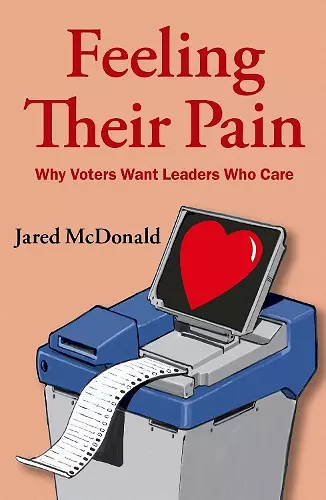Feeling Their Pain
Why Voters Want Leaders Who Care
Format:Hardback
Publisher:Oxford University Press Inc
Published:20th Dec '23
Currently unavailable, and unfortunately no date known when it will be back

The 2020 Presidential Election in the United States marked, for many, a return to "compassionate politics." Joe Biden had run on a platform of empathy, emphasizing his personal history as a means of connecting with everyone from American workers who had lost jobs to military families who had lost loved ones. Although perceptions of candidate compassion are broadly understood to influence vote choice, less understood is the question of how candidates convince voters they truly "care about people like them." In Feeling their Pain: Why Voters want Leaders who Care, Jared McDonald provides a framework for understanding why voters view some politicians as more compassionate than others. McDonald shows that perceptions of compassion in candidates for public office are based on the number and intensity of commonalities that bind citizens to political leaders. Commonalities can come in many forms, such as a shared experience ("I've been through what you've been through"), a shared emotion ("I feel the way you feel"), or a shared identity ("I am who you are"). Compassion is conceptualized through the lens of self-interest. Compassion may be universal, such as when candidates convey empathy to all individuals who are struggling. Or compassion may be exclusionary, such as when candidates express a preference for some groups over others. Thus, the way campaigns choose to wield compassion in their messaging strategies has important implications not only for election outcomes, but for American political polarization as well.
In the aftermath of an historic pandemic that laid bare the role of government in caring for its citizens, Feeling their Pain is a crucial ingredient in explaining the relationship between the government and the governed. With meticulous analysis of quantitative and qualitative data, McDonald explains how candidates appeal to citizens' broad desire for empathetic leaders, and how those citizens respond to empathetic appeals. Providing deep insights into the roots and remedies of partisan polarization, this book is essential for anyone interested in the psychology of modern American politics. * Lilliana Mason, SNF Agora Institute Associate Professor of Political Science Johns Hopkins University *
Why do presidential candidates who "feel your pain," tout "compassionate conservatism," or decry "American carnage" win over more-experienced and seemingly better-qualified opponents? In this masterful book, Jared McDonald tells us why by highlighting the profound electoral importance of compassion. Marshaling a treasure trove of evidence, McDonald contributes tremendously to our understanding of American elections as he demonstrates that empathy, or "caring about people like me," is an invaluable candidate trait. * Geoffrey C. Layman, Professor and Chair of the Department of Political Science University of Notre Dame *
Feeling Their Pain is a timely book on a topic I think will experience a rebirth in interest given the state of vitriol in contemporary American politics and the growing candidate strategy of being "compassionate." McDonald goes beyond "whether or not" compassion matters to examine why it matters, who it works for, and what this means for American politics. Academics and practitioners alike will surely have it on their bookshelves! * Frank Gonzalez, Assistant Professor of Government and Public Policy University of Arizona *
This short volume examines the role of compassion and empathy in selecting candidates for public office...McDonald argues that effectively using empathy and compassion in politics might be one way to dull the sharp edge of party polarization. Students of American campaigns and elections and campaign consultants will find this book a useful addition to their libraries. * Choice *
ISBN: 9780197696897
Dimensions: 156mm x 235mm x 17mm
Weight: 422g
200 pages